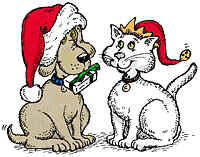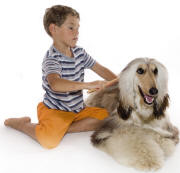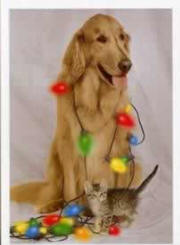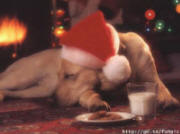Becker: Tempting because you want to share your treats with your pet, and tempting for your pet because it smells so good.
We all know the basics — that most bones are taboo and fatty trimmings are bad for your pet, but here's what you don't know: There are foods that we always see in holiday dishes that can make your pet sick or even be fatal.
Onions, which you'll often see in stuffing or other dishes, can potentially destroy pets' red blood cells and inhibit the animal's ability to coagulate blood.
Raisins — another favorite ingredient — have been associated with gastrointestinal upset. In worst cases, it can lead to fatal kidney failure.
The worst is bakers chocolate.
Becker: Be sure to keep all your chocolate pooch-proof — which includes gifts under the tree and the candy dish on the table. The most deadly chocolate is baking chocolate. The stimulants in chocolate that give us humans a delightful "chocolate buzz" can cause diarrhea, vomiting and fatal heart arrhythmias in our furry friends. If you're giving a gift with chocolate, you can really show you care if you put on the tag: "Not for Pets!" Or "Not Pet-friendly!" Then the receiver knows to put those gifts out of reach without blowing the surprise.
Decorations: We've all heard that poinsettias are harmful and drinking the tree water is bad. What are the other problems here?
Cover Electrical Cords
Becker: First, let's think about the lights. If you have cords running on the floor or wherever your pet can get at them, you run the risk of your pet chewing the cord and getting a bad shock. Many pets, especially puppies, have been rushed to the ER with burns on their tongues. So put that cord high out of the reach of puppies or cover it with PVC pipe. Another tip we all know — unplug the lights if you're not home or in the room to enjoy them.
Secure the Tree
Becker: Cats, but especially kittens, love to climb trees. It's amazing how many trees have been toppled by a two-pound kitten swaying near the tree topper. Or how many dogs have scratched their backs on a tree limb or rooted for their present under the tree and barked out "timber" in response to a falling scotch pine or fir. You can tie your tree with fishing line and hook it to the wall. It doesn't take away from the beauty and everyone stays safe.
Ornaments: No sharp hooks and no glass on lower branches
Becker: Many of us hook our ornaments onto the branches with these sharp hooks. You can just imagine what this could do to a puppy or kitten who sees it as a shiny play toy. If you use string or ribbon, you won't have to worry about the pet swallowing the hook.
And the ornaments you hang on the lower branches should be pet-friendly. Think plastic or wooden, never glass. And ornaments made of food will be too great a temptation. Maybe leave those in the box or snack on them yourself. Keep Candles Out of Reach
Becker: An innocent swish of a cat's tail over a candle's open flame, and you have a small fur fire. The cat cannot only receive serious burns, but can knock a candle over, spilling wax onto the carpet or furniture, or start a fire.
Gift Suggestion: Microchip Identification
Becker: Ten million pets are lost every year. That means one in three pets will get lost once in their lifetime. Since Fido can't remember his phone number, there is a way to keep track of your pet. A microchip like one offered by Home again is the ultimate pet gift. It's a safe, simple and permanent form of pet ID.
 The microchip is about the size of a
grain of rice and is implanted in the loose
area between the shoulder blades. Think of
it as a personal pet ID. Your pet's name and
your contact information are kept in a
database. A pet recovery team keeps watch 24 hours
a day and notifies the owner as soon as the
pet's ID number is called in. This is a must
to keep your pet safe all year round.
The microchip is about the size of a
grain of rice and is implanted in the loose
area between the shoulder blades. Think of
it as a personal pet ID. Your pet's name and
your contact information are kept in a
database. A pet recovery team keeps watch 24 hours
a day and notifies the owner as soon as the
pet's ID number is called in. This is a must
to keep your pet safe all year round.






